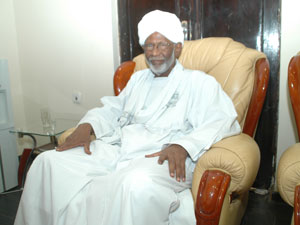
(FinalCall.com) – Looking into the reasons for Dr. Hassan Al-Turabi’s most recent arrest, his fifth since his falling out with President Omar Al-Bashir, analysis as always comes from different quarters: Political science professor at Al Neilein University Hassan Al-Sa’ori believes the detention is somehow connected to Justice and Equality Movement (JEM) leader Khalil Ibrahim’s “failure to distort the national elections.” The group had threatened “street-war and bombings within the Capital Khartoum,” said the academic.
Leading ruling National Congress Party member Rebi Abdel Atti also says Turabi’s arrest is linked to his relationship with JEM and its involvement with the renewed clashes currently taking place in Darfur.
The arrest also seemed to coincide with shutting down of the Popular Congress Party-affiliated daily Rai Al-Shaab (The People’s Viewpoint) newspaper. The PCP is Mr. Turabi’s political party and he is an Islamic scholar, former legislator and onetime supporter of the ruling regime.
Published reports suggest the PCP chair’s arrest was in response to party publication of a article alleging the Islamic Republic of Iran constructed a “weapons factory” in Sudan with the aim of supplying “Islamist insurgents in Somalia and Yemeni … as well as (the) Islamist Palestinian movement Hamas.”
Several contacts with this writer who live in Khartoum, on background, felt the Rai Al-Shaaab story was off base and felt it was the height of impropriety for Turabi to allow its publication–especially given the United States effort to discredit Iran and target the country for sanctions, if not invasion.
The story was picked up and reprinted by other news outlets, with the managing director of the Dubai based Al-Arabiya TV Abdel-Rahman Al-Rashid suggesting the report was true. “If (President Omar) Al-Bashir thinks that others do not know the truth of his dealings with the Iranians, the Revolutionary Guard camps, and their arms plant and their covert activity using Khartoum to infiltrate the states of the (Arabian) Peninsula and Egypt, he (Bashir) is wrong,” Al-Rashid wrote in the London based Al-Sharq Al-Awsat newspaper.
Looking at Professor Al-Sa’ori’s suggestion that Turabi’s arrest had to do with a plot to invade Khartoum harkens back to May 2008 when he was arrested for questioning and released two days after JEM’s raid in Omdurman on the outskirts of Khartoum. Though JEM leader Khalil Ibrahim has denied any involvement, Turabi’s past influence in the Darfurian rebel is a matter of record.
After the 1989 overthrow of Sadeq Al-Mahdi by Omar Al-Bashir, which was supported by Turabi’s National Islamic Front, he became a leading influence in the new government. From his position of authority, Turabi organized and became secretary-general of the Arab Popular and Islamic Conference. From this platform he offered Muslims from other regions, including Darfur, a means of sharing power. Then in 1999 Turabi introduced a bill into the National Assembly that would have reduced the power of the presidency. President Bashir immediately dissolved the assembly and declared a state of emergency. He purges Turabi’s supporters, including the Muslims from Darfur, from the machinery of the government. Khalil, a physician, saw this as the impenetrability of the current administration and its ruling elite. He uses the situation as the basis for an intellectual argument in a 2000 manifesto, “The Black Book: Imbalance of Power and Wealth in the Sudan.” In August 2001, Khalil announced the existence of JEM and shortly thereafter in 2003 made JEM’s presence felt by conducting a successful raid on the military airport at Al-Fashir.
Khalil, however, denies any relationship with Turabi. In fact in a June 23, 2008 Sudan Tribune piece titled “Debunking the myth around Turabi–Khalil relationship,” Deputy Chair of the General Congress for JEM Dr. Mahmoud A. Suleiman takes the relationship to task.
“When the Arabized supremacist elements in the ruling National Congress Party (NCP) accuse JEM as a ‘Military Wing’ for PCP of Al-Turabi, they reveal their arrogant and contemptuous attitude towards the marginalized people of Darfur and elsewhere. This clique of racists look at people from regions other than the Northern Riverain region as subordinates who must have a master or guardian with legal right and responsibility of taking care of their affairs. This contemptuous assumption of the NCP and others of their ilk has denied the rights and opportunities for the marginalized people to prove their potentials and abilities for decades,” Dr. Suleiman declared.
Khalil said talk of Turabi influencing the maneuvers of JEM typifies a form of “condescension to the marginalized” by depicting them as “always in need for someone to plan for them and think on their behalf.”
The real reasons behind Turabi’s most recent arrest is anyone’s guess. It could be fear of U.S. reaction like the bombing of the pharmaceutical plant in Khartoum in 1998 by the Clinton administration which the then-president claimed was producing “weapons of mass destruction.” It could be part of a plan to show the world community that it was not the ruling NCP–with the recent escalation of fighting–that violated the Doha framework for peace agreement but rebels linked to Turabi. Or maybe the government just wanted Turabi off the street during the May 27 inauguration of President Bashir. Whatever the reason, the handling of Turabi could be an indicator of how far Sudan has come and may go with political reforms in the face of recent elections and may help determine how the world deals with the struggling African nation.(To leave a comment go to http://africawatch53.blogspot.com/. Jehron can be reached at Africawatch53@gmail (dot) com.)
Related news:
Sudanese leader offers insight on politics, oil and Farrakhan (FCN, 05-28-2010)












